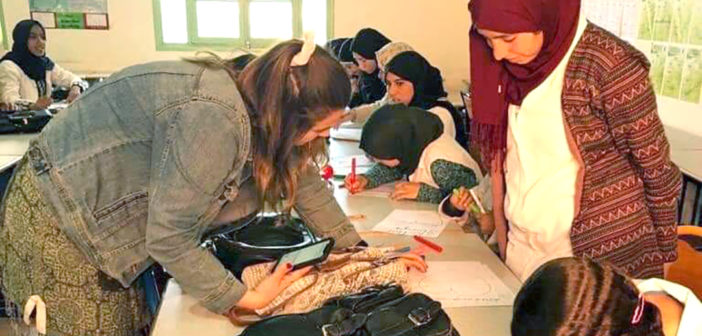The Peace Corps recently evacuated all 7,300 volunteers from their respective countries around the world to return to the United States following the coronavirus outbreak.
For the Lehigh alumni who were evacuated amid their time volunteering abroad, the decision leaves them in flux while they are forced to abruptly depart from their projects and communities.
Kevyn McConlogue, ‘19, had been volunteering in a youth development center in Morocco for the past seven months before being evacuated. McConlogue said she was heartbroken when she found out she had to go home.
“There’s no other way to describe it than just utter and complete heartbreak,” McConlogue said. “Peace Corps was all I wanted to do since I was in high school, and I worked so hard to build that life (in Morocco) for myself. I made a home there, and then it got taken from me in a day.”
McConlogue only had one afternoon to prepare before leaving for the U.S. She spent the time trying to say goodbye to as many people as she could, but she said she ended up not being able to do so for half the people she wanted to.
“The saddest part is I ended up telling them all, ‘I’ll probably return, I’ll probably return,’ because I really thought I was going to,” McConlogue said.
Tanairy Ortiz, ‘19, worked as an English teacher at Gansu Medical College in China for eight months. She and her cohort had already been adamant about leaving a positive legacy behind them, as they’d learned just weeks prior to the evacuation that they’d be the last Peace Corps cohort in China.
Since China had the first identified case of COVID-19 in 2019, the situation became serious for them quicker than it did for other cohorts around the world.
Ortiz first remembers hearing about the virus from a friend in late January, who left her worried voice messages.
Ortiz said she first thought the virus would be comparable to swine flu or other smaller-scale outbreaks, but realized its true severity a week later, when her cohort moved from China to Thailand.
Because Chinese schools were on winter break when the news of relocation came, many other Peace Corps volunteers posted at Chinese schools were on vacation in other countries. Ortiz said some volunteers had to leave their belongings behind to head straight for Thailand, including winter clothes and laptops.
Ortiz said she felt heartbroken and devastated by the end of her program, and took great pride in her work not only in teaching English, but in dismantling stereotypes of both American and Chinese cultures.
Being in China made her a resource for her family, who Ortiz said were otherwise trusting of television portrayals of Chinese people, whom she found inaccurate. She also said as a Latina, she broke down the perceptions of what a typical American looks like — perceptions of some Chinese people she had met.
“We were agents of diplomacy and understanding — and mutual cooperation between both countries,” Ortiz said. “We were doing much more than just teaching English — we were diplomats.”
Theresa Ridings, ‘18, worked in Senegal for 12 months as a health volunteer before the news of her cohort’s evacuation arrived. She heard about the virus on Twitter, but didn’t realize its severity until she saw Ortiz posting about what had happened to her cohort in China.
She said she still wasn’t too concerned because rural Senegal seemed far away from the virus’ reach. Then, on March 16, she found out about the worldwide evacuation of the Peace Corps and left Senegal four days later.
“There was a lot of anxiety from saying goodbye to everyone and coming home to an America that we don’t really know, and then concentrating on packing everything and getting everything together,” Ridings said. “There’s still a little bit of shock. I feel like most of the volunteers are only really being able to process those emotions now that we’re home.”
Even though she still had 14 months left in Senegal before she ended service in April 2021, Ridings’ cohort received full benefits, including readjustment allowance, non-competitive status for federal employment and Coverdell Scholarship eligibility. Whether a cohort received full benefits was dependent on how many months it’d been in service.
While these benefits and the benefits given to shorter cohorts help to ease the coming transition, what comes next is still up in the air for many of those who just had the next year or more of their lives rerouted.
“I still have loans to pay, and I don’t have the money to do that, even with my resettlement allowance,” McConlogue said. “Now is not the time to find a job. I just feel like I have no direction right now.”






Comment policy
Comments posted to The Brown and White website are reviewed by a moderator before being approved. Incendiary speech or harassing language, including comments targeted at individuals, may be deemed unacceptable and not published. Spam and other soliciting will also be declined.
The Brown and White also reserves the right to not publish entirely anonymous comments.